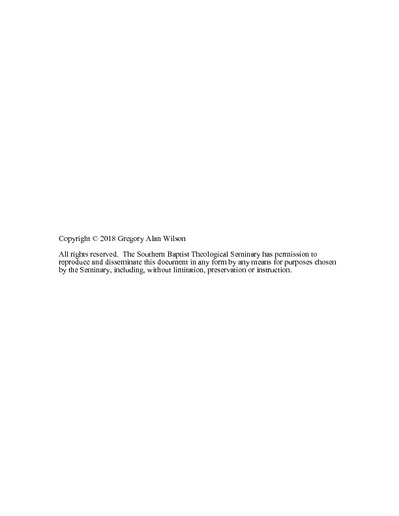Developing a Domestic Abuse Policy and Protocol for the Village Church in Flower Mound, Texas
Abstract
DEVELOPING A DOMESTIC ABUSE POLICY AND PROTOCOL FOR THE VILLAGE CHURCH IN FLOWER MOUND, TEXAS
Gregory Alan Wilson, D.Ed.Min.
The Southern Baptist Theological Seminary, 2018 Faculty Supervisor: Dr. Jeremy P. Pierre
This project developed a domestic abuse policy and protocol to assist the leaders of The Village Church in Flower Mound, Texas, in caring for victims and correcting perpetrators of domestic abuse in her midst. Chapter 1 describes the ministry context of The Village Church, including the particular challenges and complexities that exist at TVC, establishes a rationale of the need for this project, and sets out the project’s goals. This project had four goals: (1) increase baseline knowledge of all ministry staff, elders, and deacons in the care and correction of domestic abuse cases by bringing in expert master teachers to conduct an extensive initial training, (2) develop a domestic abuse policy and protocol for TVC, including specific processes and pathways for care, (3) develop a training curriculum for the ongoing training of pastors-ministers, elders, deacons, and lay leaders in domestic abuse awareness, including recognition and response, and (4) train key lay leaders, as well as new pastors-ministers, elders and deacons on a regular basis utilizing the training developed in goal 3.
Chapter 2 provides a biblical and theological understanding of domestic abuse. Biblically, abuse is a desecration of the imago Dei in both the abuser and the abused person, and a desecration of the creation mandate, requiring a God-like response by the church toward both the abused and the abuser for the advancement of God’s kingdom. It is an act of oppression. God responds to this oppression with compassion and care for the
oppressed and with anger and punishment toward the oppressor. God’s people should respond to abuse as God responds to it.
Chapter 3 presents critical elements of a church domestic abuse policy and protocol. A domestic abuse policy and protocol helps leaders protect families by answering two questions: “What is domestic abuse?” and “How do I respond lovingly and competently to a disclosure or discovery of domestic abuse?” It is critical that church leaders know how to recognize domestic abuse and how to respond to it as God does. When a church has a clear policy and protocol for domestic abuse, those inclined to abuse know that the church is not a safe place for them to abuse and those vulnerable to abuse know that the church is a safer place for them.
Chapter 4 chronicles TVC’s journey of progress, not perfection, in domestic abuse awareness, recognition, and response. This journey of growth was marked by the various stages of implementation of the project, including the initial master training, the writing and implementation of the domestic abuse policy and protocol documents, as well as a statement on divorce in cases of abuse and a statement of oppression, and the design and implementation of the ongoing training.
Chapter 5 reflects upon TVC’s journey of growth and assesses the project’s effectiveness based the project’s stated goals. I also reflect in chapter 5 on my personal growth through this project, as well as future projects that I plan to undertake. Much work remains. The hope for this project is that it would in help make Christ’s bride more beautiful through the compassionate care of victims and courageous correction of perpetrators of domestic abuse in the church.

